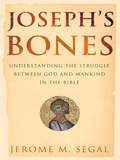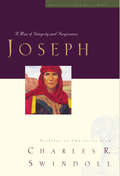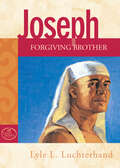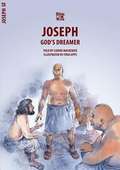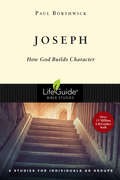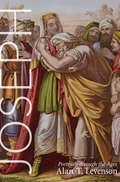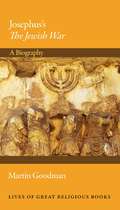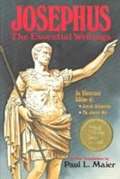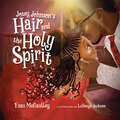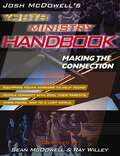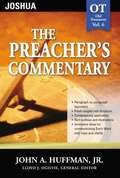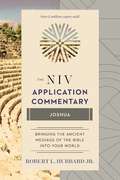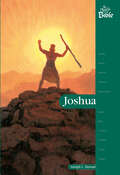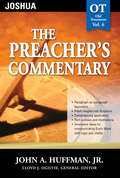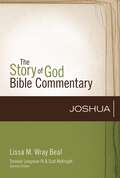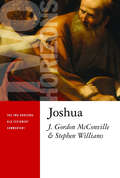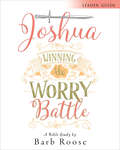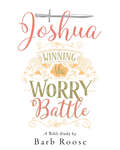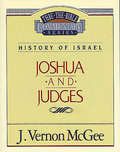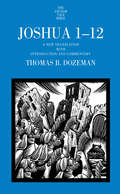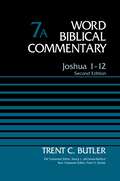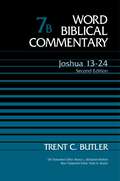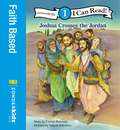- Table View
- List View
Joseph's Bones
by Jerome M. SegalA bold and radical reinterpretation of the Old Testament. "Brilliant. . . Nothing quite like it has appeared in years. " (Jack Miles, author of God: A Biography ) Imagine if someone who had never heard of Judaism or Christianity read the Old Testament. How could the relationship between God and humanity possibly be understood? In Joseph's Bones, Segal approaches the Bible from this fresh perspective-one framed by the story of the Israelites' fidelity to Joseph-and finds something unexpected: an account of the human condition that reads like an existential novel about the struggle of mankind against the unpredictable and often unwarranted wrath of God. This is a rarity in Biblical interpretation- brilliant and rigorously argued, "a work of stunning originality. "
Joseph, the Dreamer
by Clyde Robert BullaA retelling of the Bible story in which Joseph is reunited with his family many years after being sold into slavery in Egypt.
Joseph: A Man Of Integrity And Forgiveness (Great Lives From God's Word Ser. #Vol. 3)
by Charles R. SwindollNo family today is more dysfunctional than Joseph's. No one faces greated temptation than Potiphar's wife offered Joseph. No faith is challenged more severely than was Joseph's on death row. Yet Joseph stood firm, exemplifying what is possible when ordinary people maintain their connections with God. Like an epic novel filled with intrigue, tension, and torrential emotions, Joseph's triumphiant story touches us all. This third volume in Charles Swindoll's"Great Lives" series presents a fresh look at one of the most intriguing characters in the Old Testament and focuses on the virtue of forgiveness in the face of deceit and betrayal.
Joseph: Forgiving Brother (God's People)
by Lyle L LuchterhandWho was Joseph in the Bible?Joseph’s story is awe-inspiring. From Jacob’s favorite son to despised brother, from hopeless slave to executor of Potiphar’s household, from the apple of his master’s eye to accused rapist, from the stink of an Egyptian dungeon to the throne room of a great pharaoh, Joseph’s life is unsurpassed for tragic drama and stunning deliverance.Yet, for all of the reasons Joseph had to harbor bitter resentment toward those who had wronged him, most amazing was his capacity to forgive and his earnest desire to restore the hearts of his repentant brothers.If you’re wondering who Joseph was, or want to know how Joseph’s faith journey impacts your own, this book is for you!Joseph is part of the God’s People series by Northwestern Publishing House. It’s a wonderful collection about the lives and times of some of God’s chosen people. Plots and settings have been taken directly from the Bible, and each book features beautifully detailed, full-color illustrations.
Joseph: God's Dreamer
by Carine MackenzieJoseph's dream had come true at last! God had spoken to him and prepared him for a very special job... Find out what it was and learn how God looks after his people in every situation. You can read about this story in the Bible in Genesis, chapters 37-46.
Joseph: How God Builds Character (LifeGuide Bible Studies)
by Paul BorthwickJoseph faced hard times--more than once. He was sold into slavery by his brothers. He spent years imprisoned because of a false accusation. And yet Joseph was able to live in forgiveness and hope, and God did great things in his life every step of the way. Paul Borthwick invites you to explore Joseph's story as a way toward discovering how God's dreams might be fulfilled in and through you. These nine session LifeGuide Bible Study features questions for starting group discussions and for meeting God in personal reflection, together with leader's notes and a "Now or Later" section in each study. For over three decades LifeGuide Bible Studies have provided solid biblical content and raised thought-provoking questions—making for a one-of-a-kind Bible study experience for individuals and groups. This series has more than 130 titles on Old and New Testament books, character studies, and topical studies. PDF download with a single-user license; available from InterVarsity Press and other resellers.
Joseph: Portraits through the Ages
by Dr Alan T. LevensonThe complex and dramatic story of Joseph is the most sustained narrative in Genesis. Many call it a literary masterpiece and a story of great depth that can be read on many levels. In a lucid and engaging style, Alan T. Levenson brings the voices of Philo, Josephus, Midrash, and medieval commentators, as well as a wide range of modern scholars, into dialogue about this complex biblical figure. Levenson explores such questions as: Why did Joseph’s brothers hate him so? What is achieved by Joseph’s ups and downs on the path to extraordinary success? Why didn’t Joseph tell his father he was alive and ruling Egypt? What was Joseph like as a husband and father? Was Joseph just or cruel in testing his brothers’ characters? Levenson deftly shows how an unbroken chain of interpretive traditions, mainly literary but also artistic, have added to the depth of this fascinating and unique character.
Josephus's The Jewish War: A Biography (Lives of Great Religious Books #45)
by Martin GoodmanAn essential introduction to Josephus’s momentous war narrativeThe Jewish War is Josephus's superbly evocative account of the Jewish revolt against Rome, which was crushed in 70 CE with the siege of Jerusalem and the destruction of the Temple. Martin Goodman describes the life of this book, from its composition in Greek for a Roman readership to the myriad ways it touched the lives of Jews and Christians over the span of two millennia.The scion of a priestly Jewish family, Josephus became a rebel general at the start of the war. Captured by the enemy general Vespasian, Josephus predicted correctly that Vespasian would be the future emperor of Rome and thus witnessed the final stages of the siege of Jerusalem from the safety of the Roman camp and wrote his history of these cataclysmic events from a comfortable exile in Rome. His history enjoyed enormous popularity among Christians, who saw it as a testimony to the world that gave rise to their faith and a record of the suffering of the Jews due to their rejection of Christ. Jews were hardly aware of the book until the Renaissance. In the nineteenth century, Josephus's history became an important source for recovering Jewish history, yet Jewish enthusiasm for his stories of heroism—such as the doomed defense of Masada—has been tempered by suspicion of a writer who betrayed his own people.Goodman provides a concise biography of one of the greatest war narratives ever written, explaining why Josephus's book continues to hold such fascination today.
Josephus: The Essential Writings
by Flavius JosephusAn award-winning translation and condensation of Jewish Antiquities and The Jewish War. Translated and edited by Paul L. Maier.
Josey Johnson's Hair and the Holy Spirit
by Esau McCaulleyWhen Josey wonders why people are so different, Dad helps her understand that our differences aren't a mistake. In fact, we have many differences because God is creative!
Josh McDowell's Youth Ministry Handbook: Making the Connection
by ZondervanDrawing on the wisdom of insightful leaders around the country, Josh McDowell's Youth Ministry Handbook equips youth workers to help kids connect with God--and with their parents, their peers, and a world in need of Christ. Featuring articles from Dawson McAllister, Barry St. Clair, Jim Burns, Tony Campolo, Al Menconi, John Maxwell, George Barna, and others, this is an invaluable leadership resource with practical, useful ideas for today's youth workers.
Joshua
by Joseph F. GirzoneJoshua, "A parable for today" is the story of a quiet man, whose benevolence and selfless work in the community prompts amazement as well as suspicions. He lives simply and carves beautiful statues of wood, yet inspires people to a greater faith, which causes such enmity among the priests that he is sent to Rome for a hearing. His is no ordinary journey. A well-written and inspiring novel.
Joshua (Preacher's Commentary, Volume #6)
by John A. Huffman Jr.General editor Lloyd J. Ogilvie brings together a team of skilled and exceptional communicators to blend sound scholarship with life-related illustrations. The design for the Preacher's Commentary gives the reader an overall outline of each book of the Bible. Following the introduction, which reveals the author's approach and salient background on the book, each chapter of the commentary provides the Scripture to be exposited. The New King James Bible has been chosen for the Preacher's Commentary because it combines with integrity the beauty of language, underlying Hebrew and Greek textual basis, and thought-flow of the 1611 King James Version, while replacing obsolete verb forms and other archaisms with their everyday contemporary counterparts for greater readability. Reverence for God is preserved in the capitalization of all pronouns referring to the Father, Son, or Holy Spirit. Readers who are more comfortable with another translation can readily find the parallel passage by means of the chapter and verse reference at the end of each passage being exposited. The paragraphs of exposition combine fresh insights to the Scripture, application, rich illustrative material, and innovative ways of utilizing the vibrant truth for his or her own life and for the challenge of communicating it with vigor and vitality.
Joshua (The NIV Application Commentary)
by Robert L. Hubbard, Jr.The NIV Application Commentary helps you communicate and apply biblical text effectively in today's context.The book of Joshua recounts major transitions in the lives of God's chosen people and speaks of subjects that are difficult to comprehend, such as war and ethnic cleansing. Robert Hubbard navigates through these chapters, probing beneath the surface of the biblical text to apply the timeless themes of the book of Joshua to our lives in the twenty-first century.To bring the ancient messages of the Bible into today's context, each passage is treated in three sections:Original Meaning. Concise exegesis to help the reader understand the original meaning of the biblical text in its historical, literary, and cultural context.Bridging Contexts. A bridge between the world of the Bible and the world of today, between the original context and the contemporary context, built by discerning what is timeless in the timely pages of the Bible.Contemporary Significance. This section identifies situations that are comparable to those faced by the original audience and explores personal, cultural, and societal applications of the passage to those situations. The author also alerts the reader to problems they may encounter when seeking to apply the passage and helps them think through the issues involved.This unique, award-winning commentary is the ideal resource for today's preachers, teachers, and serious students of the Bible, giving them the tools, ideas, and insights, they need to communicate God's Word with the same powerful impact it had when it was first written.
Joshua (The People's Bible)
by Adolph L HarstadWhat is the book of Joshua about? Who is Joshua in the Bible?After the leadership of Moses, God chose Joshua to lead his people into the land he had promised them. The book of Joshua tells how God helped his people conquer the Promised Land. Not only did the walls of Jericho come tumbling down in this book of the Bible, but the Lord also granted many other victories to them.Want to learn more? If you’re wondering what the book of Joshua in the Bible is about, this book is for you!Joshua is a reliable Bible commentary. It’s down to earth, clearly written, easy to read and understand, and filled with practical and modern applications to Scripture.It also includes the complete text of the book of Joshua from the NIV Bible. The Christ-centered commentaries following the Scripture sections contain explanations of the text, historical background, illustrations, and archaeological information. Joshua is a great resource for personal or group study!This book is a part of The People’s Bible series from Northwestern Publishing House.
Joshua (The Preacher's Commentary)
by John HuffmanGeneral editor Lloyd J. Ogilvie brings together a team of skilled and exceptional communicators to blend sound scholarship with life-related illustrations.The design for the Preacher's Commentary gives the reader an overall outline of each book of the Bible. Following the introduction, which reveals the author's approach and salient background on the book, each chapter of the commentary provides the Scripture to be exposited. The New King James Bible has been chosen for the Preacher's Commentary because it combines with integrity the beauty of language, underlying Hebrew and Greek textual basis, and thought-flow of the 1611 King James Version, while replacing obsolete verb forms and other archaisms with their everyday contemporary counterparts for greater readability. Reverence for God is preserved in the capitalization of all pronouns referring to the Father, Son, or Holy Spirit. Readers who are more comfortable with another translation can readily find the parallel passage by means of the chapter and verse reference at the end of each passage being exposited. The paragraphs of exposition combine fresh insights to the Scripture, application, rich illustrative material, and innovative ways of utilizing the vibrant truth for his or her own life and for the challenge of communicating it with vigor and vitality.
Joshua (The Story of God Bible Commentary)
by Lissa Wray BealA new commentary for today's world, The Story of God Bible Commentary explains and illuminates each passage of Scripture in light of the Bible's grand story.The first commentary series to do so, SGBC offers a clear and compelling exposition of biblical texts, guiding everyday readers in how to creatively and faithfully live out the Bible in their own contexts. Its story-centric approach is ideal for pastors, students, Sunday school teachers, and laypeople alike.Each volume employs three main, easy-to-use sections designed to help readers live out God's story:LISTEN to the Story: Includes complete NIV text with references to other texts at work in each passage, encouraging the reader to hear it within the Bible's grand story.EXPLAIN the Story: Explores and illuminates each text as embedded in its canonical and historical setting.LIVE the Story: Reflects on how each text can be lived today and includes contemporary stories and illustrations to aid preachers, teachers, and students. —Joshua—The book of Joshua continues the story of Genesis to Deuteronomy, bringing Israel into the land promised Abraham in Genesis 12. Joshua's emphasis on God&’s gift of the land, the conduct of warfare and the treatment of Canaan's inhabitants, and the importance of obedience to the law of Moses all arise out of this long narrative.Edited by Scot McKnight and Tremper Longman III, and written by a number of top-notch theologians, The Story of God Bible Commentary series will bring relevant, balanced, and clear-minded theological insight to any biblical education or ministry.
Joshua (The Two Horizons New Testament Commentary)
by Stephen Williams Gordon McConvilleThe book of Joshua is often troubling — what should we make of the fact that the violent occupation of land is not simply presented, but celebrated? How can we reconcile that with the key role the book plays in the biblical drama of salvation? What should we make of the God of Joshua? / In this volume Gordon McConville and Stephen Williams interpret Joshua in relation to Christian theology, addressing such questions and placing the book in its proper place in the canonical whole. McConville deals specifically with the commentary and exegesis of the text. Williams then moves in to focus on issues of interpretation. He addresses key theological themes, such as land, covenant, law, miracle, judgment (with the problem of genocide), and idolatry. / The authors posit that the theological topics engaged in Joshua are not limited to the horizons of the author and first readers of the book, but that Joshua is part of a much larger testimony which concerns readers yet today.
Joshua - Women's Bible Study Leader Guide: Winning the Worry Battle (Joshua)
by Barb RooseBe Victorious Over Worry in Your Life!Have you ever tried to fight worry with faith and felt you were losing the battle? Have comments like “God’s got this!” or “Just pray about it” only left you feeling more burdened? We know we shouldn’t worry, but the reality is that we all do at times. And whether it’s personal worries about loved ones and daily circumstances or broader concerns about what’s happening in the world, we long for something more than platitudes that will help us put real feet to our faith and win the worry battle.In this six-week Bible study on the Book of Joshua, we will join God’s people as they arrive on the edge of the promised land only to find themselves in hostile territory, faced with fear and uncertainty. As we dig into the story of how Joshua and the Israelites claimed God’s promised victory, we’ll discover that winning the worry battle requires more than having faith; it requires learning to fight in faith! Following their bold, courageous footprints, we’ll learn how to fight in faith as we internalize God’s promises, draw strength from God’s faithfulness, act in obedience to God’s commands, and believe what our limitless God can do. Through in-depth study of how God gave the Israelites victory over their enemies and generously blessed them, too, we’ll be equipped with biblical wisdom, encouragement, and practical tools that will enable us to overcome our daily worry struggles as well as the bigger battles of fear that we face.This comprehensive leader guide includes full session outlines featuring discussion questions, activities, prayers, leader helps, and more.Other available components, each available separately, include a Participant Workbook with five days of lessons per week, and DVD with six 20-25 minute sessions (with closed captioning).
Joshua - Women's Bible Study Participant Workbook: Winning the Worry Battle (Joshua)
by Barb RooseBe Victorious Over Worry in Your Life!Have you ever tried to fight worry with faith and felt you were losing the battle? Have comments like “God’s got this!” or “Just pray about it” only left you feeling more burdened? We know we shouldn’t worry, but the reality is that we all do at times. Whether it’s personal worries about loved ones and daily circumstances or broader concerns about what’s happening in the world, we long for something more than platitudes that will help us put real feet to our faith and win the worry battle.In this six-week Bible study on the Book of Joshua, we will join God’s people as they arrive on the edge of the promised land only to find themselves in hostile territory, faced with fear and uncertainty. As we dig into the story of how Joshua and the Israelites claimed God’s promised victory, we’ll discover that winning the worry battle requires more than having faith; it requires learning to fight in faith! Following their bold, courageous footprints, we’ll learn how to fight in faith as we internalize God’s promises, draw strength from God’s faithfulness, act in obedience to God’s commands, and believe what our limitless God can do. Through in-depth study of how God gave the Israelites victory over their enemies and generously blessed them, too, we’ll be equipped with biblical wisdom, encouragement, and practical tools that will enable us to overcome our daily worry struggles as well as the bigger battles of fear that we face.The participant workbook includes 5 lessons for each week with space for recording reflections and answers.Other available components, each available separately, include a Leader Guide and DVD with six 20-25 minute sessions (with closed captioning).
Joshua / Judges: History of Israel (Thru the Bible #10)
by J. Vernon McgeeRadio messages from J. Vernon McGee delighted and enthralled listeners for years with simple, straightforward language and clear understanding of the Scripture. Now enjoy his personable, yet scholarly, style in a 60-volume set of commentaries that takes you from Genesis to Revelation with new understanding and insight. Each volume includes introductory sections, detailed outlines and a thorough, paragraph-by-paragraph discussion of the text. A great choice for pastors - and even better choice for the average Bible reader and student! Very affordable in a size that can go anywhere, it's available as a complete 60-volume series, in Old Testament or New Testament sets, or individually.
Joshua 1-12
by Thomas B. DozemanAn acknowledged expert on the Hebrew Bible, Thomas Dozeman offers a fresh translation of the Hebrew and Greek texts of the book of Joshua and explores the nature, function, and causes of the religious violence depicted therein. By blending the distinct teachings of Deuteronomy and the Priestly literature, Dozeman provides a unique interpretation of holy war as a form of sacred genocide, arguing that, since peace in the promised land required the elimination of the populations of all existent royal cities, a general purging of the land accompanied the progress of the ark of the covenant. This essential work of religious scholarship demonstrates how the theme of total genocide is reinterpreted as partial conquest when redactors place Joshua, an independent book, between Deuteronomy and Judges. The author traces the evolution of this reinterpretation of the central themes of religious violence while providing a comparison of the two textual versions of Joshua and an insightful analysis of the book's reception history.
Joshua 1-12, Volume 7A: Second Edition (Word Biblical Commentary #7)
by Peter H. Davids Trent C. Butler Nancy L. deClaisse-WalfordTrent C. Butler's excellent commentary on Joshua is updated and revised. This new edition takes into account the most recent scholarly work on the book of Joshua. The commentary includes Butler's translation of the text, explanatory notes, and commentary to help any professor, student, or pastor with research and writing. Features include:-solid biblical scholarship for teachers, pastors, and students-updated bibliography commentary for deeper study-thorough coverage of the biblical languages-close analysis of ancient manuscripts of Joshua The Word Biblical Commentary series offers the best in critical scholarship firmly committed to the authority of Scripture as divine revelation. It is perfect for scholars, students of the Bible, ministers, and anyone who wants a theological understanding of Scripture.
Joshua 13-24, Volume 7B: Second Edition (Word Biblical Commentary)
by Peter H. Davids Trent C. Butler Nancy L. deClaisse-WalfordTrent C. Butler's excellent commentary on Joshua is updated and revised. This new edition takes into account the most recent scholarly work on the book of Joshua. The commentary includes Butler's translation of the text, explanatory notes, and commentary to help any professor, student, or pastor with research and writing. Features include:-solid biblical scholarship for teachers, pastors, and students-updated bibliography commentary for deeper study-thorough coverage of the biblical languages-close analysis of ancient manuscripts of Joshua The Word Biblical Commentary series offers the best in critical scholarship firmly committed to the authority of Scripture as divine revelation. It is perfect for scholars, students of the Bible, ministers, and anyone who wants a theological understanding of Scripture.
Joshua Crosses the Jordan River: Level 1 (I Can Read! #Level 1)
by Crystal BowmanChristian parents especially appreciate books for their young readers that help them understand more about God. Reading the Bible can be a very overwhelming challenge for young readers. Therefore, Bible stories written in a learn-to-read format are a welcomed product. This is the idea behind the proposal Bible Stories for I Can Read! Level1. When interesting stories from the Bible are written with on-level vocabulary, the child gains knowledge of Scripture and biblical truths while developing his or her reading skills. The result is a meaningful and positive reading experience for the child.
